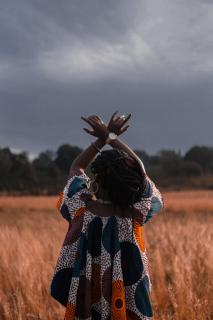Claiming My Worth
By JeKaren Olaoya
“…come celebrate
with me that everyday
something has tried to kill me
and has failed.”
—Lucille Clifton, “won’t you celebrate with me” from Book of Light.
Copyright © 1993 by Lucille Clifton. Reprinted by permission of Copper Canyon Press.
I spent much of the last year writing poetry as a spiritual practice, and as an outlet to express collective grief and hope for the future in the year of a pandemic. I shared my poems a few times a week on my Facebook page, happy to connect with my community during a time when I felt isolated.
On the more popular poems, I noticed people leaving questions: “Who wrote this? This is really good!” Or “Did YOU write this?” It seemed flattering on the surface. I thought, “They thought my poems were good! They thought they were so good I couldn’t possibly have been the writer!”

This could not be my work. This had to be written by someone else. Not me. These thoughts haunted me as I wrote. I questioned whether my identity as a Black Woman was the catalyst for the questions. Black and Brown people are often met with surprise and disbelief in their work, as if they are inherently incapable of spiritual connection and depth. I’d dreamed of writing a book of poetry in 2020; for every poem I shared, I had another that was reserved just for publication.
Ignoring the spiritual and emotional connections I cultivated in my life, I started to lean into it, saying that my poetry was “divinely inspired,” a separation of me from my work. I started to share fewer of my poems until I stopped sharing entirely… and eventually stopped writing them. If the work was good enough to be viewed as “good” but wasn’t good enough to be my own, why share it? Stopping my spiritual practice of writing was a separation of myself from Spirit, a separation that led me to question my own worth and dignity.
It finally occurred to me that doubting my work was not a personal attack, it was a defense. Recognizing that I was a writer meant acknowledging me as an equal, a privilege not extended to Black people often, and only as early as 1964, when the Civil Rights Act established anti-discrimination laws and voting rights.
But I affirm that I am worthy of being good enough to touch hearts and souls, and connect others to Spirit. That worthiness is in each of us, inherent, and we can embrace and safely feel all the feelings that come up: pain, rejection, heartache, longing, love, hope. We don’t have to doubt goodness.
Prayer
Divine Spirit, it is so easy to throw up a shield of protection in the form of doubt, but that doesn’t lead to growth or connection. Help us to realize that being vulnerable is a gift. We don’t have to doubt the worth of others nor ourselves when we are reflected out in the world.